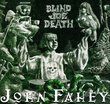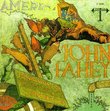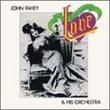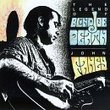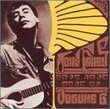| All Artists: John Fahey Title: Rivers & Religion Members Wishing: 2 Total Copies: 0 Label: Import [Generic] Release Date: 5/15/2001 Album Type: Import Genres: Country, Blues, Folk, Pop Styles: Traditional Blues, Traditional Folk, Contemporary Folk Number of Discs: 1 SwapaCD Credits: 1 |
Search - John Fahey :: Rivers & Religion
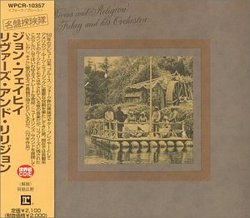 | John Fahey Rivers & Religion Genres: Country, Blues, Folk, Pop
Japanese-only reissue & the worldwide CD debut for the first of two LPs the folky/ bluegrass guitarist cut for Reprise in the early '70s. Contains all nine cuts from when the label originally released it in 1972. 1999 ... more » |
Larger Image |
CD DetailsSynopsis
Album Description Japanese-only reissue & the worldwide CD debut for the first of two LPs the folky/ bluegrass guitarist cut for Reprise in the early '70s. Contains all nine cuts from when the label originally released it in 1972. 1999 release. Similar CDs
|
CD ReviewsHypnotic, peaceful, beautiful Robert Moore | Chicago, IL USA | 01/04/2004 (5 out of 5 stars) "Although I have since obtained a slew of great John Fahey albums, several better than OF RIVERS AND RELIGION, this one retains a special place in my heart. Partly this is because it was the first John Fahey album I ever purchased. I was seized by it immediately. It isn't quite like any other album I had heard either before or since. Compared to his other albums, it isn't terribly virtuosic: Fahey isn't keen to put on display his utter masterly of complex and startling chord progressions and harmonics (though some do exist on the album; check out various breathtaking moments in his dobro work on "Steamboat 'Gwine the Bend"). This is dramatically toned-down Fahey, and not just on the numbers where he is accompanied by an "orchestra" of such instruments as banjo and mandolin. This album evokes a lazy river on a summer day, and the playing keeps that mood throughout. A perfect example of what makes me love this album is "Dixie Pig BBQ Blues," where Fahey plays lazily, slowly, and deliberately to a background banjo and mandolin to create a sense of nostalgia that is almost palpable. Fahey plays even more restrained than usual, as if to confirm that the mood is the thing in the piece, not the virtuosic skills of the performers. The band is equally superb and comparably restrained on the magnificent "Funeral Song for Mississippi John Hurt."One of the great regrets of my concert-going life is that I never heard John Fahey live. In recent years before his death, his health prevented him from performing anywhere, and when he was finally able to perform again, his health caused frequent cancellations. In the summer of 2000 I went to the Empty Bottle in Chicago hoping to hear him, but he had to cancel because of his health. He died not too long afterwards." A spiritually soothing and beautiful recording. jimnypivo | west of Chicago, USA | 10/05/2006 (5 out of 5 stars) "This disc is IMHO, one of Fahey's best in both execution and in vision. Time magazine agreed with me, when it named this recording to its Top Ten List of 1972. Unfortunately, the 2000 initial pressings didn't sell that well. I'm glad I bought one of them. The first of two albums that John Fahey recorded for Reprise in the 1970's---`After the Ball' was the second. Both featured orchestral accompaniment by a crew of Dixieland jazz greats hand-picked by Fahey and producer Denny Bruce. `Of Rivers and Religion' has only eight tracks, but each one is outstanding in a different way. Track 1, `Steamboat Gwine Round de Bend' is a slow, sliding delta blues tune in which you can almost envision the steamboat drifting thru the turgid river on a hot Mississippi day. When I had this on vinyl, I'd turn down the tracking and play it even slower. Wish I could do that on my CD. `Medley: Deep River/Ol' Man River' When Fahey plays hymns and sacred music, he seems to offer up his playing as in prayer, regardless of whatever beliefs John had at the time. Fahey loved medleys, and became particularly adroit at blending tunes together. I believe Kottke picked that up from him. The medleys on this disc are two of JF's finest. `Dixie Pig Bar-B-Q Blues' An elegantly arranged piece of deliberate, fingerpicking guitar accompanied by 4-string banjo strumming ,mandolin, and fiddle, all of them interlacing their melodies, without colliding with each other. `Texas and Pacific Blues': Dixieland instruments back a pair of slide guitar/dobros and 4-string banjo, while a trumpet plays the lead blues melody, as majestic and proud as a Preservation Hall performance. `Funeral Song for Mississippi John Hurt': A best-known JF tune, recorded many times, but always with reverence and respect for Hurt and his music. This is JF's clearest recording of the song. You can hear every Fahey finger striking every string. `Medley: By the Side of the Road/I Come, I Come' One of the most beautiful sounds that can be heard on a guitar occurs at the point of where `By the Side of the Road' transitions to `I Come, I Come'. " Must have, must hear music. Another one for the Ages. Clifford Teapes | Elko, Nevada | 03/07/2006 (5 out of 5 stars) "This album may not be as consistently STRONG as some of Fahey's solo instrumental records, but it is the equal of any in inventiveness. John's use of a "folk" orchestra here seems prefectly appropriate, a worthwhile extension of his guitar style. Here the orchestra picks up where the moody, evocative overtones of John's solo guitar leave off. The orchestra's brass captures some of the very same moods and timbres Fahey's solo guitar captured on the earlier instrumental guitar records. Fahey really knew what he was doing when he put this orchestra behind him. Yes, his guitar work is a bit "buried" in the mix, but the sound has the same effect: haunting and very memorable."
|

 Track Listings (8) - Disc #1
Track Listings (8) - Disc #1